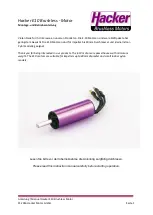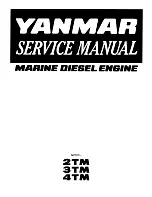
INTRODUCTION
Some GN series engine applications may be equipped with
a 12-volt DC electric cranking system. Such a system converts
electrical energy from a battery into mechanical energy at the
starter motor, for the purpose of turning the engine over for
starting.
Generally, two types of cranking systems are used in GN
series engine applications. These are (a) the starter contac-
tor system and (b) the heavy duty cranking switch system.
NOTE: Cranking systems discussed in this manual are
typical systems. The actual cranking system used in
specific applications may differ. Refer to the wiring
diagram and/or electrical schematic in the Owner's
Manual for specific applications.
NOTE: Vertical crankshaft engines used in recreational
vehicle applications are equipped with a cranking and
starting system that is controlled by a solid-state cir-
cuit board. This system is a "starter contactor" type, with
the starter contactor energized by circuit board action.
For instructions and information order "DIAGNOSTIC
REPAIR MANUAL — RECREATIONAL VEHICLE GENERA-
TORS" (Generac Part No. 94468).
STARTER CONTACTOR SYSTEM
When the start-stop switch is held at START, battery current
flows through the STARTER CONTACTOR coil and to ground
via the switch. The starter contactor energizes, its contacts
close, and battery output is delivered to the starter motor. The
motor energizes, and the engine is cranked (Figure 6.1).
Figure 6.1— Schematic of Typical Starter Contactor System
HEAVY DUTY SWITCH SYSTEM
The heavy duty switch contacts are closed manually to
deliver battery voltage to the starter motor.
STARTER MOTOR OPERATING PRINCIPLES
Closure of the circuit to the starter motor allows battery cur-
rent to flow through a commutator, to the loops of wire in
the armature, and back to the battery. The interaction of the
magnetic fields causes the armature to revolve.
The armature rotates at a relatively high speed to provide
sufficient torque to crank the engine. The required engine
cranking speed is relatively slow, so the starter motor is
equipped with a small drive pinion that meshes with the teeth
of a flywheel ring gear to crank the engine. The large ring
gear and the small starter pinion gear results in a gear reduc-
tion that can vary in ratio up to 19-to-1. This reduction allows
the starter to rotate at high speeds while cranking the engine
at low speeds.
When the engine starts, its speed increases quickly. For
example, if the engine reaches 100 rpm and the starter
pinion remains meshed with the ring gear, the starter arma-
ture would spin at about 1,900 rpm (19-to-1 ratio). To prevent
damage to the armature, a "Bendix Drive" mechanism is used
to disengage the starter pinion from the ring gear when the
engine has started.
THE BENDIX DRIVE
When the field coils of the starter drive are energized, the
armature starts to turn. A loose fitting sleeve inside the pinion
gear is turned with the armature. This sleeve has large spiral
threads on its surface that match the pinion gear’s internal
threads. The sleeve turns with the armature, and the pinion
gear rotates on the threads to move outward on the sleeve.
Outward movement of the pinion gear causes that gear to
mesh with the flywheel ring gear. The pinion hits a stop on
the sleeve, and the pinion turns the ring gear and engine.
On start-up, the engine turns faster than the armature. This
causes the pinion to spin back on the spiral threads of the
sleeve and out of engagement with the ring gear.
STARTER MOTOR REPAIRS
If the starter motor is defective, it should be removed
and replaced. Disassembly and repair of the motor is not
cost effective.
STARTER MOTOR REMOVAL:
To remove the starter from the engine, loosen and dis-
connect the starter wire, then remove the two hex head
screws that hold the starter in place.
STARTER MOTOR INSTALLATION:
To install the starter motor, reverse the previous steps.
TORQUE SPECIFICATION
HEX HEAD SCREWS ON STARTER MOTOR
216 INCH POUNDS
26
SECTION 6: ELECTRIC STARTERS AND BATTERIES
GENER
A
C
Summary of Contents for GN190H
Page 1: ......
Page 6: ...4 DIMENSIONS AND FEATURES G E N E R A C PTO SIDE VIEW BOTTOM VIEW MOUNTING HOLES...
Page 7: ...5 DIMENSIONS AND FEATURES FRONT VIEW...
Page 8: ...6 DIMENSIONS AND FEATURES G E N E R A C STARTER SIDE VIEW PTO CRANKSHAFT OPTIONS VIEW...
Page 15: ...13 NOTES...
Page 23: ...21 NOTES...
Page 39: ...NOTES 37...
Page 62: ...Printed in U S A Copyright 1999 Generac Power Systems Inc...
















































